PERUGIA – Een verhaal in het Engels. Alle lezingen waren in die taal, ieder woord dat ik erover opschreef en vanuit daar dus ook veel van mijn gedachtes.
Thursday
10.00 Building the future of investigative reporting: what is the responsibility of news leaders?
“A lot of things happening in this world are because of investigative journalism. This often is government work. It doesn’t get as much views as the Kardashians, but it is way more important.”

11.00 Supporting the next generation of African journalists
African countries show us why journalism is important. Why a free press and access to information is important. But it leaves me with one question. Sitting in that audience, watching two white persons being the good, willing, rich journalist ‘rescuing’ the two black ladies on the left, I wonder if this is an image you want to give?
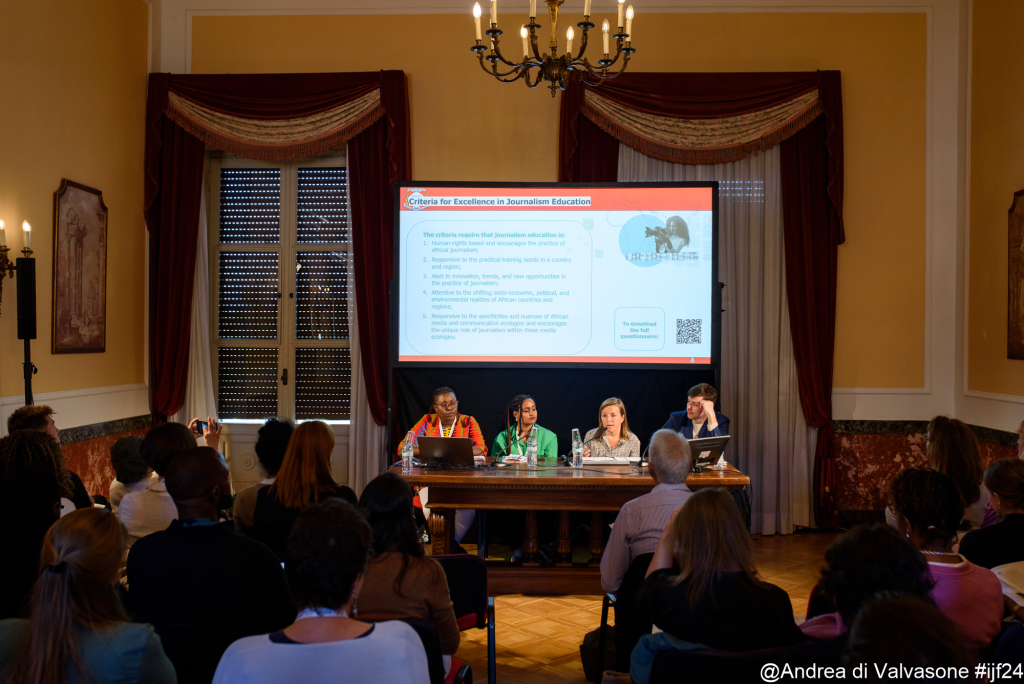
12.35 SV-Docs
Three Dutchies with the most Dutch accent you could possibly think of, are talking about their new funding for documentaries. It is a strange contrast with all the other meetings at the event. I smile a bit at the questions being asked by journalists from other countries. “Where does the money come from?” As a Dutchie myself, the answer is quite simple. The money comes from Radio Veronica, (try saying that with a somehow English accent) a former Dutch radio channel probably run by a few old white men with way too much money. What did this meeting show me? Our cute small country has too little to worry about.
14.00 Truth in the age of climate crisis
When it comes to covering climate change, make sure you ask the ones who are most impacted. “What are you feeling? What do you see? What are the challenges?”
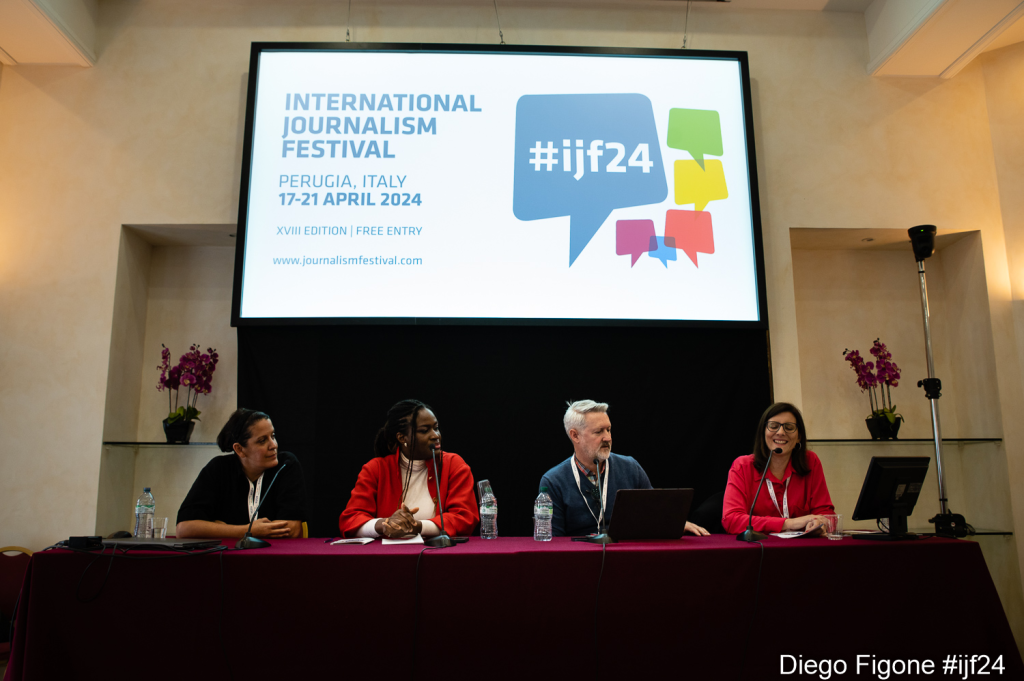
15:00 Covering China Safely, Ethically and Fairly
Marije Vlaskamp is China Analist for Volkskrant. She had serious issues with the Chinese government which led to her having to carefully consider every step. In covering China, she is worried of being framed as an activist.
This meeting showed me that it is so hard to report on a country if you don’t know the society. “You must understand that you don’t fully understand.”

17:00 Investigating ship migrants
A very strong piece of investigative journalism. “Survivors are the heart of every story. No humans mean no one relates, and no one wants to read it.” But how do you get in touch with shipwreck survivors? Who.postet.what.com gives you the option to target Facebook posts. Type in #rip + area and you will most likely find relatives of the victims in the comment section.
But maybe the two guys from lighthouse reporters were a bit too strong in their story. After a while it became too technical for me to follow.

Friday
10:00 Can journalism survive AI?
“What is the role of journalism if we have AI?” I didn’t really get an answer to that in those 50 minutes, but I tried to draw the conclusion myself.
AI is a learning machine. It is a model that is mostly pretty good at predicting. Predicting the next word for example.
“AI discriminates”, one of the speakers claims. It makes me think about the most interesting thing we CAN use AI for. AI is based on the world as it truly is. It is based on things that for sure exist, we can’t fool AI. So why don’t we use AI to expose the mistakes we are currently making, the errors that have been in our society for decades. If AI shows it, because it reflects our society, we know what to fix, right?
Despite that, I believe that the journalists on that stage where a bit too optimistic, saying that journalists should not be afraid to lose their jobs to a computer. “AI produces bad journalism. If you would write like that as a journalist, you would be fired.” I think they are completely forgetting the fact that AI is only developing more and more. Is it impossible that there is going to be a point that AI is as good as a journalist? Or even better?
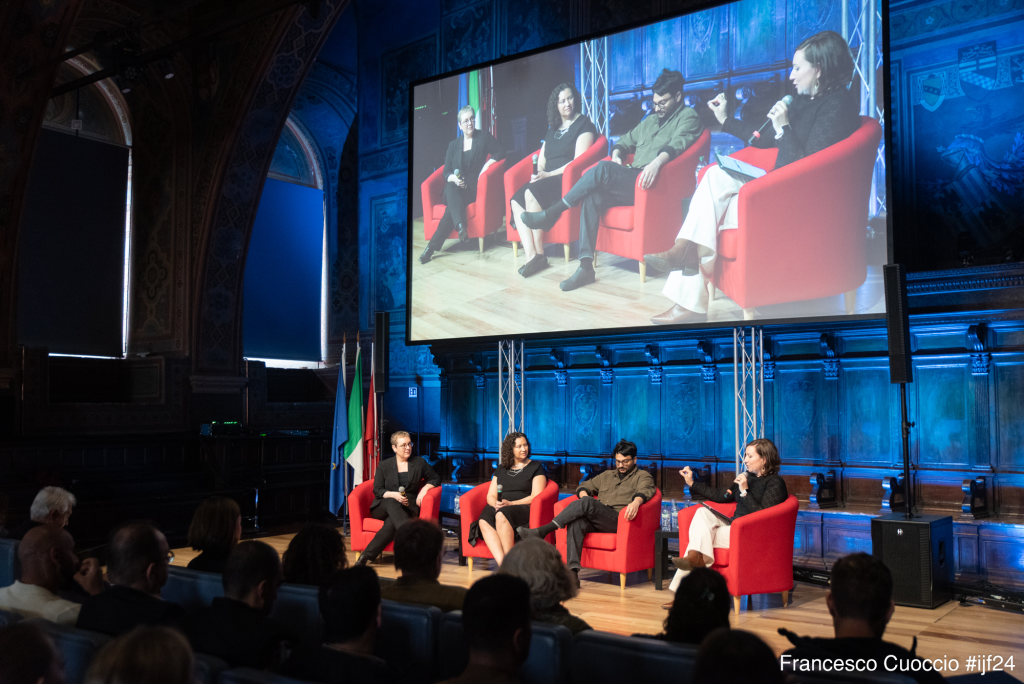
11.00 Preserving history: the story of the Russian independent media archive
Masha Gessen is a Russian-American journalist. As an activist he is openly against Vladimir Putin and Donald Trump. While watching him speak I google his name, and stumble upon one of the most interesting Wikipedia pages I have ever seen. His appearance is stunning and every word that leaves his mouth is to the point.
“We can’t believe things that are unbelievable, even if it happens right in front of our eyes.”
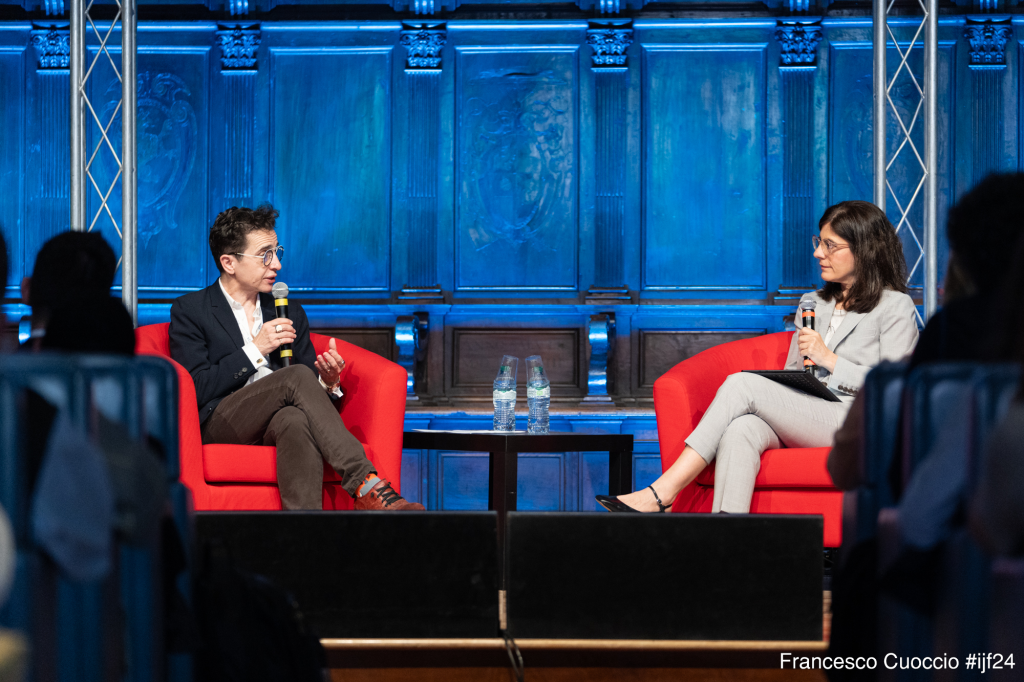
12:00 The scars of war reporting
Fergal Keane, former BBC war reporter and writer of the Madness. A book I want to read from beginning to end, after listening to his story on this stage in Perugia. “Why not say what happened? Why would I step back and let there be speculations?” He is talking about the PTSD he ended up with after covering those wars.
“I am a war junky. Being in those places makes me feel so alive. Being in the present of death makes you feel alive. It is the only addiction that people ever praise you for. If you are lucky enough to reach home, you can collect the price. Otherwise, you get a big funeral, your friends read you poems and you will be forgotten. It is the obsession of my life.”
“There is no point in me saying that you shouldn’t go. That would make me a hypocrite. But take care of yourself, don’t be afraid to talk about feelings. You are responsible for your own mental health and that should come first.”
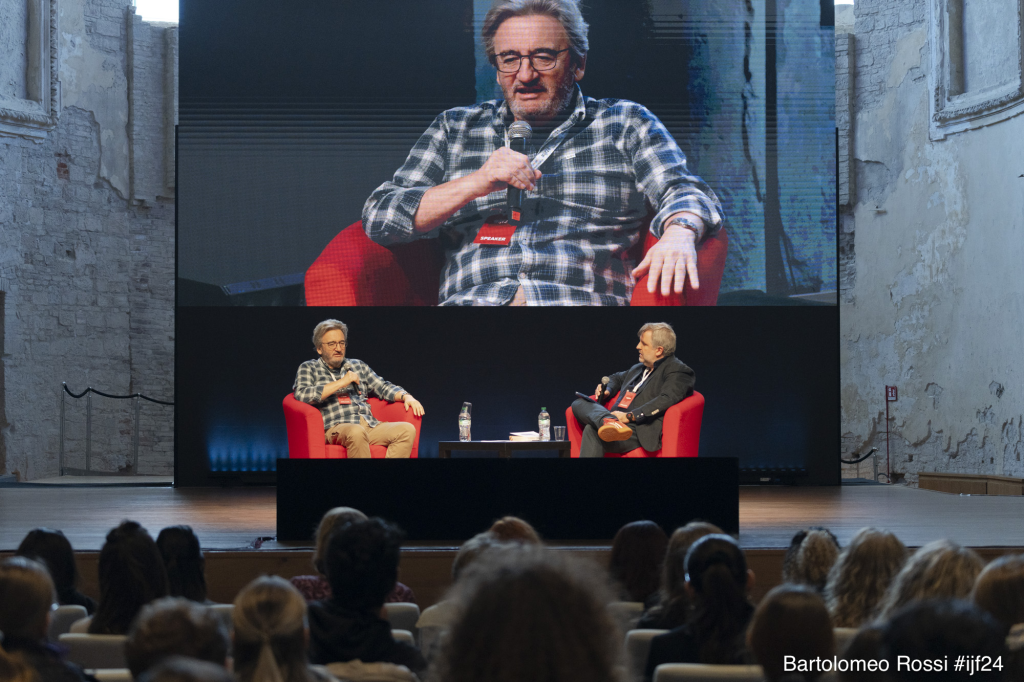
12:35 Motaz Azaiza: Gaza through the local lens
Motaz Azaiza is a 24-year-old photographer from the Gaza Strip. He couldn’t make it to Perugia, but while being absent, he probably made more impact on me than all the present speakers. We watched a 9-minute video by Motaz on the war. 107 days of reporting Gaza. “We don’t show these images to shock or to harm. People risk their lives for this, the least we can do is watch.”
“If we want to see change in this world, we can’t look away. I lost my trust in the world; I still have hope in people.”
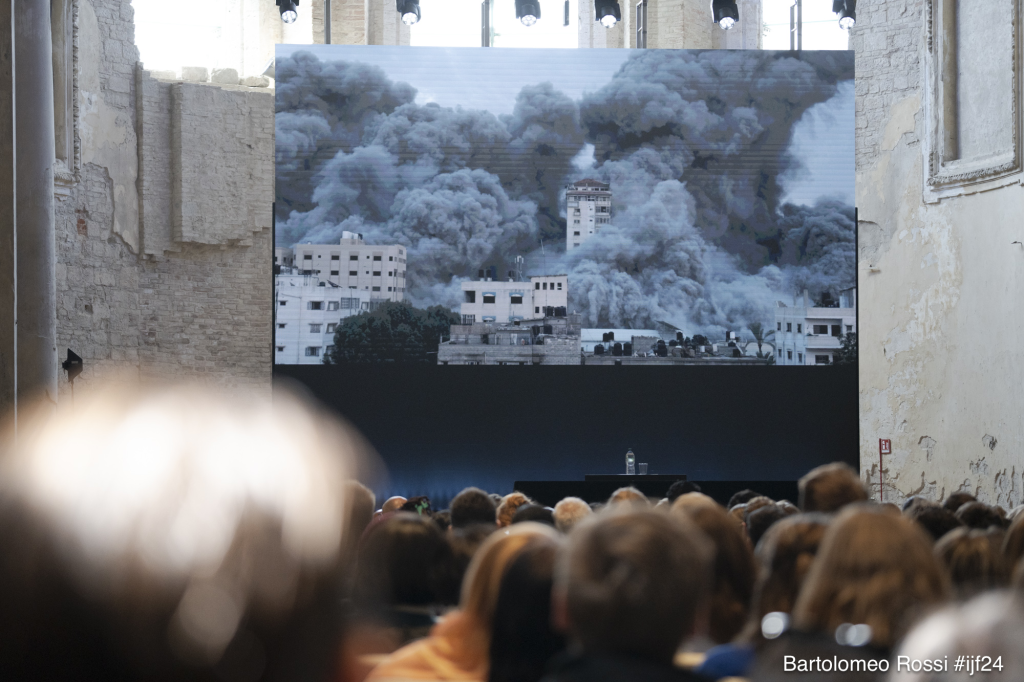
14:00 How can we pursue the investigations of silenced journalism?
Forbidden stories finish stories that could not be finished because journalists got either killed or put in jail for finding the truth. In 2024, over 100 journalists were killed for doing their jobs. The presenter sums up the countries. “Myanmar, Honduras, Azerbaijan, Philippines… and even the US.” I can’t help but smile a bit when she says ‘and even the US’. As if that is so surprising.
What is the risk of the stories we are making? In the Netherlands we can do and say basically whatever we want. News programs as Even tot hier and De avondshow met Arjan Lubach contain loads of critic upon the government. Tim Hofman was probably already killed a dozen times because of Boos, if it wasn’t for our almost excellent freedom of press. After this meeting I am positive we need to appreciate what we have way more. Stop hating ‘the media’, don’t shoot the messenger. We need to appreciate that our system is as it is, and that our democracy wouldn’t have been so strong if it wasn’t for journalism and the media.
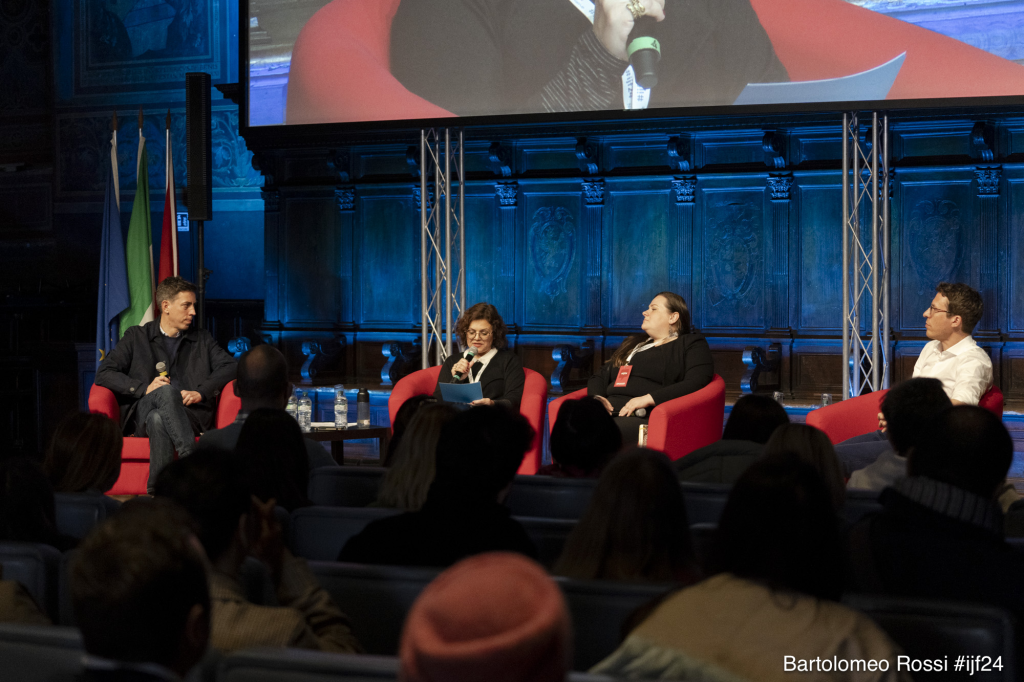
15:00 The art of war reporting
Just some good quotes that tell the entire story:
“A good war reporter is a good journalist. If you think it is about you, you failed already. Try to find the truth. I am a big believer of the truth.”
“War reporting is about knowing what happened because somebody was there and reported on it.”
“You need to understand the politics otherwise it is just white noise.”
(I think white noise is a very powerful term to keep in mind as a western journalist. Always.)
“Use the people to explain what is happening.”
“If I cannot save people, at least I have to make sure I document it.”
These quotes are by Jeremy Bowen and Ron Haviv. Two passionate and interesting journalists with endlessly important stories to tell.

Saturday
11:00 Covering Gaza against the odds
The meeting after which none of us was able to attend another meeting for a while. As strange as it sounds, I feel privileged that I had the opportunity to watch these people speak. To listen to Palestinian women crying and telling their part of the story. We would not have been informed if it wasn’t for these journalists in Gaza. These journalists, and the journalists who got killed there.
“Journalism is a weapon. Your pen is a weapon.”
I feel so privileged that they thought me that. And since I had that change, I feel the need to do something with that information. And as that feeling gets stronger and stronger, I promise myself that I am going to use my pen and my freedom of speech, to change lives. And maybe, one day, change a piece of the world.
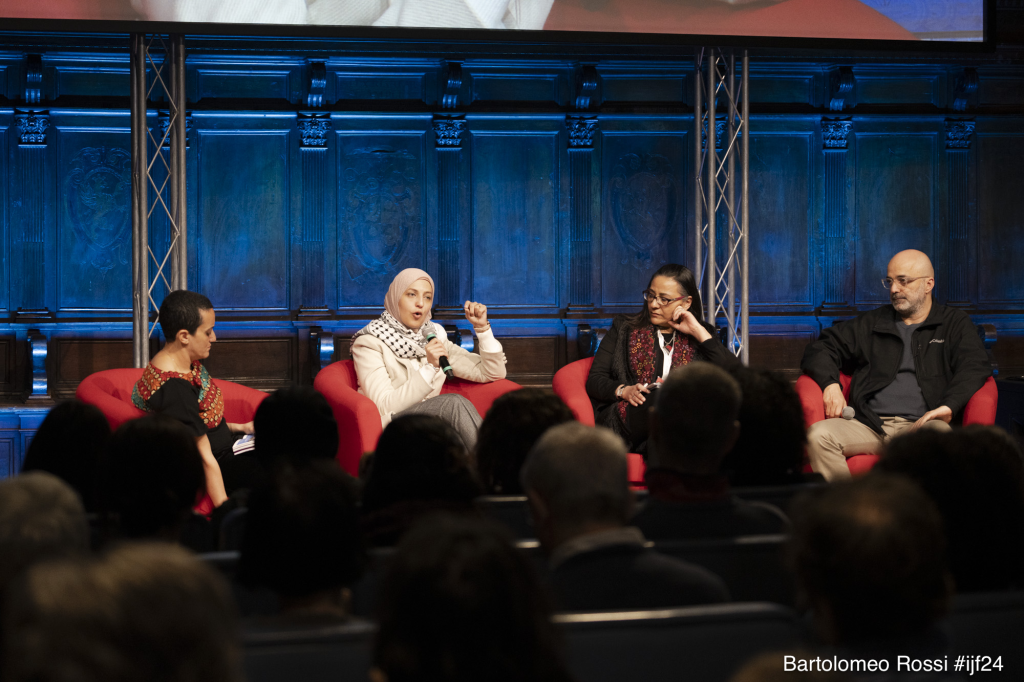
18:00 Putin’s eternal return to the Kremlin. What is Russia turning into?
It feels far from true. The people speaking in this meeting spoke up against the Russian regime. One story touches me in particular. Evgenia is the wife of a journalist in the Russian prison. She tells us that she is only able to speak to her husband 10 minutes a year over the phone. He is kept in a 6m^2 cell with no access to books, paper or a pen. His bed is stuck to the wall for the biggest part of the day. It’s a modern way of torture. Making people feel alone. Breaking people.
“If we want to have peace on this continent, we need to stop Putin. We need a democratic Russia. And without taking care of past mistakes, we can’t look into the future.”
“Russia is a dictatorship. Which means no freedom of media. Russia also is a multinational country. Europe has no idea what to do with Russia.” It takes me back to the presentation about China. We don’t understand at all what Russia is like. Then how can we know how to report on it?
